

Workplace Training and Education: Does it Makes Sense? Workshop by ECV, Wikimedia Commons With an increasing skills gap and an aging workforce, a number of employers are reconsidering their reluctance to train new and existing employees beyond the essentials.
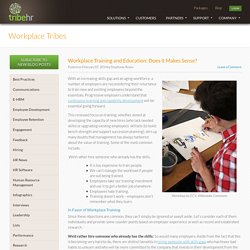
Progressive employers understand that continuous learning and capability development will be essential going forward. This renewed focus on training, whether aimed at developing the capacity of new hires (who lack needed skills) or upgrading existing employees’ skillsets (to build bench strength and support succession planning), stirs up many doubts that management has always harbored about the value of training. Some of the most common include. We’d rather hire someone who already has the skills. Workplace Training and Education: How Adults Learn. Be forewarned—this post is going to get a little academic.
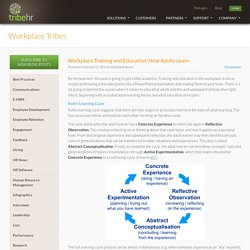
Training and education in the workplace is not as simple as throwing a few data points into a PowerPoint presentation and reading them to your team. There is a lot going on behind the scenes when it comes to educating adults and this and subsequent articles dive right into it, beginning with accepted adult learning theory and adult education principles.
Kolb’s Learning Cycle Kolb’s learning cycle suggests that there are four stages or processes that form the basis of adult learning. The four processes follow and build on each other, forming an iterative cycle. Relearning the Art of Asking Questions. Qualities of a Good Trainer. Adult learning has a much greater chance of success when the trainer or teacher is competent.
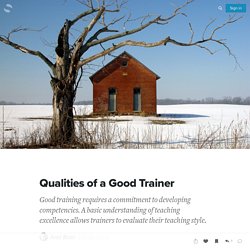
An instructor that strives for excellence will demonstrate each of the following qualities of a good trainer. Adult Learning Principles. What is the objective of Training ? Build Motivation by Building Learner Participation. By Barbara Garner The Goodwill Learning Center in Seattle is in an enviable position: supported by Goodwill Industries and private grants, it is not dependent upon government funds.
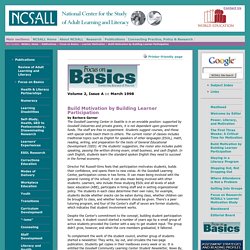
The staff are free to experiment. Students suggest courses, and those with special skills teach them to others. The current roster of classes includes traditional topics such as English for speakers of other languages (ESOL), math, reading, writing, and preparation for the tests of General Educational Development (GED). At the students' suggestion, the roster also includes public speaking, passing the written driving exam, small business, and cash English. In cash English, students learn the standard spoken English they need to succeed in the formal economy.
Director Pat Russell-Sims feels that participation motivates students, builds their confidence, and opens them to new vistas. Despite the Center's commitment to the concept, building student participation isn't easy. Curriculum Development for Adult Learners in the Global Community: Volume I, Strategic Approaches.
Book by Victor C.X.
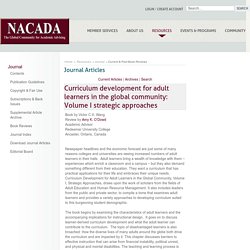
Wang Review by Amy K. O’Dowd Academic Advisor Redeemer University College Ancaster, Ontario, Canada Newspaper headlines and the economic forecast are just some of many reasons colleges and universities are seeing increased numbers of adult learners in their halls. 7 Ways to Develop a Training Plan. Alpine : A Higher Education Project. Български Deutsch Eesti Ελληνικά English Français Gaeilge Italiano Latviski Lietuviškai Magyar Nederlands Polski Português Română Slovensko Slovensky Suomi Svenska The most important distinguishing characteristic of the post-compulsory sector or emergent system, is its learner-centred curriculum practice, althought doubtless progressive school teachers would claim it is no more learner –centred than some stages, at least, of schooling.

Focusing upon learners rather than upon subject or discipline knowledge has of course, extremely important implications for development and planning, and many policy innovations in recent years have brought about structural changes in the institutional system in favour of the individual learner. An important consequence of the learner-centredness of the post-compulsory sector is a change in the educator’s primary role, away from that of teacher towards facilitator, mentor, learning manager, and so on.